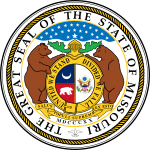
Robert Lee Holden Jr. is an American politician who served as the 53rd governor of Missouri from 2001 to 2005. A member of the Democratic Party, he previously served as the Missouri state treasurer from 1993 to 2001 and represented the 136th district in the Missouri House of Representatives from 1983 to 1989. Since leaving public office, Holden has worked at Webster University, where he founded the Holden Public Policy Forum, and serves as the president and chairman of the United States Heartland China Association.

Melvin Eugene Carnahan was an American lawyer and politician who served as the 51st governor of Missouri from 1993 until his death in 2000. Carnahan was a Democrat and held various positions in government.

Jean Anne Carnahan was an American politician and writer who was the First Lady of Missouri from 1993 to 2000, and served as the state's junior United States senator from 2001 to 2002. A Democrat, she was appointed to fill the Senate seat of her husband Mel Carnahan, who had been posthumously elected after his death in October, becoming the first woman to represent Missouri in the U.S. Senate.

Roger Byron Wilson is an American politician who served as the 44th lieutenant governor of Missouri from January 1993 to October 2000 and as the 52nd governor of Missouri from October 2000 to January 2001. Wilson was serving his second four-year term as lieutenant governor and was preparing to retire from elected public service when Governor Mel Carnahan died in a plane crash on October 16, 2000. Wilson first became acting governor and was sworn in as governor when Carnahan’s death was confirmed.
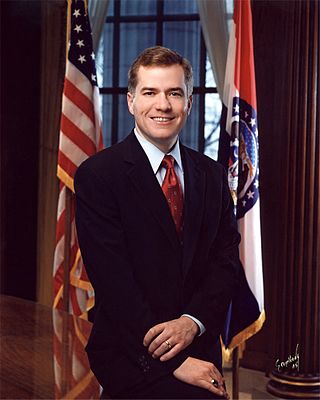
Matthew Roy Blunt is an American politician and former naval officer who served as the 54th governor of Missouri from 2005 to 2009. He previously served ten years in the United States Navy and as Missouri secretary of state.

John Russell Carnahan is an American politician from the state of Missouri. A member of the Democratic Party, he served as the U.S. representative for Missouri's 3rd congressional district from 2005 to 2013.
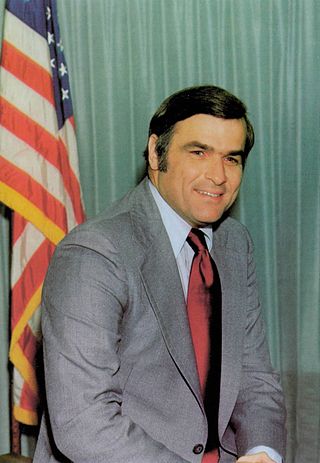
Joseph Patrick Teasdale was an American politician. A Democrat, he served as the 48th Governor of Missouri from 1977 to 1981. Teasdale was formerly a prosecutor for Jackson County, Missouri. In 1972, he made his first bid for governor, placing third in the Democratic primary, but attaining name recognition and the nickname "Walking Joe". In 1976, after initially running for U.S. Senate, Teasdale switched races and made a second bid for the Governor's office. He won the nomination and defeated incumbent Kit Bond in an upset. In 1980, Teasdale beat back a primary challenge from State Treasurer Jim Spainhower, but was defeated by Bond in a rematch. After leaving office, Teasdale returned to practicing law until his death.

The 2006 United States Senate election in Missouri was held November 7, 2006, to decide who would serve as senator for Missouri between January 3, 2007, and January 3, 2013. This election was the fifth consecutive even-number year in which a senate election was held in Missouri after elections in 1998, 2000, 2002, and 2004.

William Lawrence Webster is an American lawyer, former politician and convicted felon from Missouri. He served in the Missouri House of Representatives and later as the 39th Attorney General of Missouri from 1985 to 1993. After failing to win election as governor in 1992, Webster pleaded guilty to felony embezzlement.
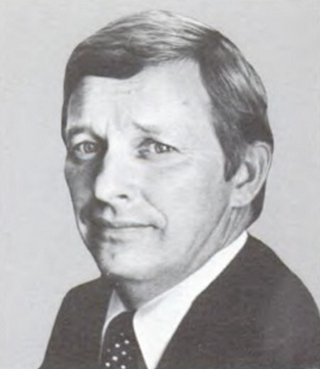
Robert Wendell Bailey is an American politician from Missouri. He graduated from Southwest Missouri State University, where he was a member of Tau Kappa Epsilon Fraternity, with a degree in Business Administration and owned an automobile dealership in Willow Springs.

Judith K. Moriarty is an American politician from Missouri. She was the first woman to serve as Missouri Secretary of State. She was impeached in 1994 for conduct issues, and forced from office. She was a member of the Democratic Party, until 2005, switching to the Libertarian Party.

The 2000 United States Senate election in Missouri was held on November 7, 2000, to select the next U.S. senator from Missouri. Incumbent Republican senator John Ashcroft lost re-election to a second term to Democratic governor Mel Carnahan despite Carnahan's death in a plane crash 20 days before Election Day. Newly inaugurated governor Roger Wilson appointed Mel Carnahan's widow Jean Carnahan to fill the seat pending a 2002 special election.
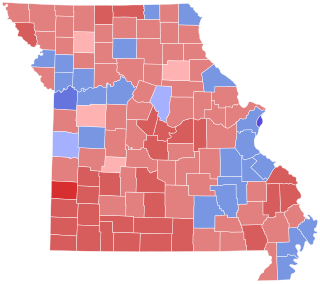
The 2002 United States Senate special election in Missouri was held on November 5, 2002, to decide who would serve the rest of Democrat Mel Carnahan's term, after he died while campaigning and posthumously won the 2000 election. The winner would serve the remainder of the term ending in 2007. Governor Roger Wilson appointed Carnahan's wife Jean, also a Democrat, to serve temporarily. She then decided to run to serve the remainder of the term, but she was narrowly defeated by Republican nominee Jim Talent.

The 2010 United States Senate election in Missouri took place on November 2, 2010, alongside 36 other elections to the United States Senate in other states as well as elections to the United States House of Representatives and various state and local elections. Primary elections were held on August 3, 2010. Incumbent Republican U.S. Senator Kit Bond decided to retire instead of seeking a fifth term. Republican nominee Roy Blunt won the open seat.

Elections were held on November 2, 2010, to determine Missouri's nine members of the United States House of Representatives. Representatives were elected for two-year terms to serve in the 112th Congress from January 3, 2011, until January 3, 2013. Primary elections were held on August 3, 2010.
Edward Robert Martin Jr. is an American politician and attorney from the state of Missouri. He is president of Phyllis Schlafly Eagles, which was split from Eagle Forum, and president of the Eagle Forum Education & Legal Defense Fund.

The 2012 United States House of Representatives elections in Missouri were held specifically on Tuesday, November 6, 2012, and elected the eight U.S. representatives from the state of Missouri, a loss of one seat following the 2010 United States census. The elections coincided with the elections of other federal and state offices, including a federal quadrennial presidential election, concurrent statewide gubernatorial election, quadrennial statewide lieutenant gubernatorial election, and an election to the U.S. Senate.
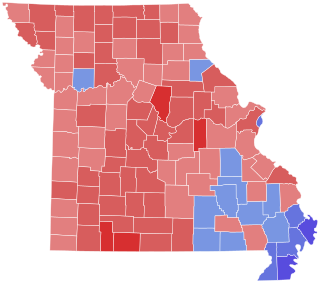
The 1976 United States Senate election in Missouri took place on November 2, 1976. Incumbent Democratic U.S. Senator Stuart Symington decided to retire, instead of seeking a fifth term.
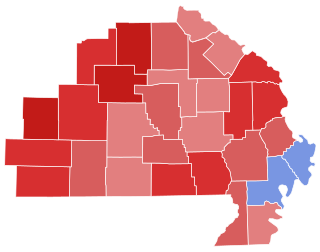
A special election for Missouri's 8th congressional district was held on June 4, 2013, following the resignation of Jo Ann Emerson on January 22, 2013, to head the National Rural Electric Cooperative Association. The Republican and Democratic parties selected their own nominees without a primary.

Richard Prescott Sifton Jr. is an American politician and lawyer who was a member of the Missouri Senate for the 1st district from 2013 to 2021. Sifton took office in 2013 after defeating incumbent Republican Senator Jim Lembke in a close election. Sifton was a candidate in the 2022 U.S. Senate election in Missouri, but later withdrew.

